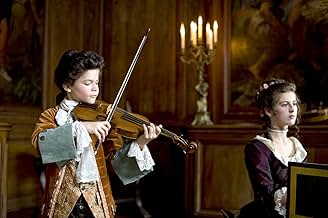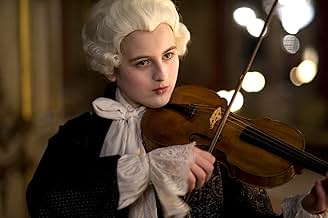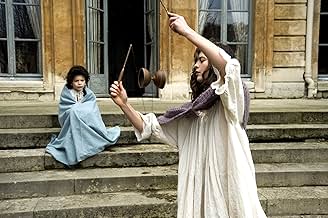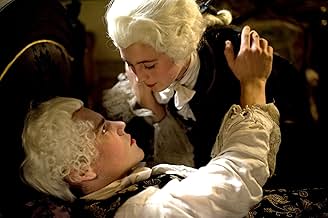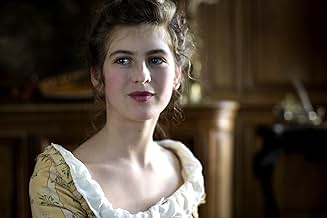VALUTAZIONE IMDb
6,4/10
1646
LA TUA VALUTAZIONE
Aggiungi una trama nella tua linguaA reimagined account of the early life of Maria Anna 'Nannerl' Mozart, five years older than Wolfgang, and a musical prodigy in her own right.A reimagined account of the early life of Maria Anna 'Nannerl' Mozart, five years older than Wolfgang, and a musical prodigy in her own right.A reimagined account of the early life of Maria Anna 'Nannerl' Mozart, five years older than Wolfgang, and a musical prodigy in her own right.
- Regia
- Sceneggiatura
- Star
- Premi
- 2 vittorie e 8 candidature totali
Recensioni in evidenza
Stop me if you've heard this one before: Mozart, that legendary impresario, had an sibling who actually helped write a lot of his early work, and got precisely no credit for it... due to the sexist society at the time. She was also a brilliant violinist, but was forced to play the harpsichord by her father as the violin 'was no instrument for a lady.' Meanwhile, everyone mooned over her brother, the 'child prodigy', leaving her completely in the shade. In fact, a lot of what she could have achieved she didn't thanks to the patriarchal beliefs back in the 18th century, and by the sound of the epilogue she had a pretty miserable life after she gave up on all her hopes and dreams. Nice.
How much of this has a basis in reality I don't know, but I suspect there's a fair bit of airbrushing of history here. What can't be denied though, is this is a well acted drama of family ties and unfulfilled potential, full of wonderful classical music and handsome costumes. This is strictly a placid affair... You're not going to see any fireworks going off, and some people may find it all a bit too stagy. But Nannerl is a captivating lead, and while her story might not be 100% accurate as depicted here, it's well worth investing the nearly two hours to discover it. And isn't that really what matters, at the end of the day? 6/10
How much of this has a basis in reality I don't know, but I suspect there's a fair bit of airbrushing of history here. What can't be denied though, is this is a well acted drama of family ties and unfulfilled potential, full of wonderful classical music and handsome costumes. This is strictly a placid affair... You're not going to see any fireworks going off, and some people may find it all a bit too stagy. But Nannerl is a captivating lead, and while her story might not be 100% accurate as depicted here, it's well worth investing the nearly two hours to discover it. And isn't that really what matters, at the end of the day? 6/10
the beauty of costumes and music. the touching story of a great and obscure sacrifice. Marie Feret as lovely Nannerl. and Wolfgang as secondary character. important is not the historical accuracy or the legend's proportion. but the atmosphere. it is only a film about a little known biography , well made, nice to beautiful, recreation of a myth in new therms, seductive for the details and for the new perspective about a well known subject. a film about art and about a life in shadow. a film about success and about the truth. proposing a new hero. special for be not usual drawing portrait of an admirable woman. that could be all. or just the beginning for the viewer who rediscover the Mozart family in different light.
Wolfgang Mozart's older sister was exceptionally talented. And, as she grew, her family discouraged her and put all their energy into her brother and pushed her to marry and have a family. All this is shown in the film and cannot really be refuted. However, the filmmaker's have decided to take some liberties--to ASSUME certain things about Maria Mozart that we simply do not know to be true today. In that sense, it's quite a bit like "Amadeus"--fictionalizing history a bit here and there. The story has a strong feminist bent--and even goes so far as to attribute much of Wolfgang's talent to her! This is rather dubious, as Wolfgang clearly was insanely gifted. It's an intriguing idea--but there really isn't any basis for this assertion. Now this complete fiction COULD have worked--but the rest of the story is incredibly dull--very, very mannered, slow and lacking anything to hook the viewer. 'What if' just isn't enough to carry the rest of the film and I felt EXTREMELY restless as the film progresses. My butt also fell asleep--and it's a great judge of whether or not a film is too tedious!
I saw this at the FilmFest DC in April 2011.
The story was complex on so many levels: the wonderful family relationship of the Mozarts as they travelled around Europe. The strong feminine influences; the strictures of society that allow the older sister's intellect to waste away; the daughters of the king who were locked away in isolation.
The costumes were authentic without being overly lush.
The relationship between the young Wolfgang and his older sister was quite touching.
The growth of the lead actress from barely a teen to a woman accepting her fate was written (all within a year or so) and acted very well.
There was an interesting subplot with the king's daughter that showed the two girls/women accepting the same fate albeit at different levels of society.
The story was complex on so many levels: the wonderful family relationship of the Mozarts as they travelled around Europe. The strong feminine influences; the strictures of society that allow the older sister's intellect to waste away; the daughters of the king who were locked away in isolation.
The costumes were authentic without being overly lush.
The relationship between the young Wolfgang and his older sister was quite touching.
The growth of the lead actress from barely a teen to a woman accepting her fate was written (all within a year or so) and acted very well.
There was an interesting subplot with the king's daughter that showed the two girls/women accepting the same fate albeit at different levels of society.
It's difficult for me to see a film like this as a professional musician without seeing red at the same time. No, I'm not expecting a slavish rehash of history - far from it -but it wandered so far from reality as to remind me of films such as "Song to Remember" with Cornel Wilde swinging through the grapevines and playing the frail, tubercular Chopin at the same time.
Leopold Mozart, despite the general feeling that he pushed his children unmercifully, was actually trying to help his children become established in the world and to prevent his son from squandering his money as he was always tempted to do. In fact poor Wolfgang was buried in a pauper's grave after his father died.
The music in the film is another bone of contention. Instead of using something from the immense amount of music Wolfgang composed as background, it substituted a fake Classical imitation with romantic harmonies and orchestration that really wasn't good to begin with.
As for the ultra-low lighting we associate with "le film noir' or crime shows currently on television, we had to depend too often on dialog alone to guide us through what was happening. I realize that filming interiors with candles was period but even people sitting next to them were mainly in the dark. I know this is handy for not having to provide full period sets in detail but still I felt cheated.
This is a French work, nonetheless, and as so many French films are prone to do, it talks itself to death.
Curtis Stotlar
Leopold Mozart, despite the general feeling that he pushed his children unmercifully, was actually trying to help his children become established in the world and to prevent his son from squandering his money as he was always tempted to do. In fact poor Wolfgang was buried in a pauper's grave after his father died.
The music in the film is another bone of contention. Instead of using something from the immense amount of music Wolfgang composed as background, it substituted a fake Classical imitation with romantic harmonies and orchestration that really wasn't good to begin with.
As for the ultra-low lighting we associate with "le film noir' or crime shows currently on television, we had to depend too often on dialog alone to guide us through what was happening. I realize that filming interiors with candles was period but even people sitting next to them were mainly in the dark. I know this is handy for not having to provide full period sets in detail but still I felt cheated.
This is a French work, nonetheless, and as so many French films are prone to do, it talks itself to death.
Curtis Stotlar
Lo sapevi?
- BlooperNear the opening of the film, Nannerl tells Louise that she is 14, almost fifteen. This place the action in the winter of 1765-66. While the character Louise says she is 13, the real Louise would have been 28 years old. In fact, the princess return to court from the Abbey of Fontevraud in 1750, the year before Nannerl's birth.
I più visti
Accedi per valutare e creare un elenco di titoli salvati per ottenere consigli personalizzati
- How long is Mozart's Sister?Powered by Alexa
Dettagli
- Data di uscita
- Paese di origine
- Siti ufficiali
- Lingua
- Celebre anche come
- Mozart's Sister
- Luoghi delle riprese
- Aziende produttrici
- Vedi altri crediti dell’azienda su IMDbPro
Botteghino
- Budget
- 4.500.000 USD (previsto)
- Lordo Stati Uniti e Canada
- 707.885 USD
- Fine settimana di apertura Stati Uniti e Canada
- 34.046 USD
- 21 ago 2011
- Lordo in tutto il mondo
- 1.380.379 USD
Contribuisci a questa pagina
Suggerisci una modifica o aggiungi i contenuti mancanti


